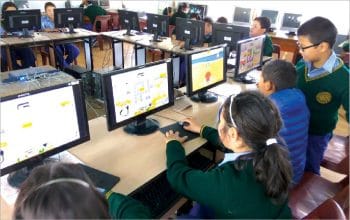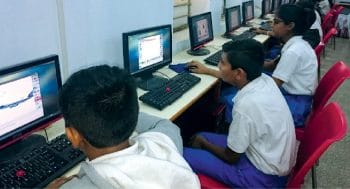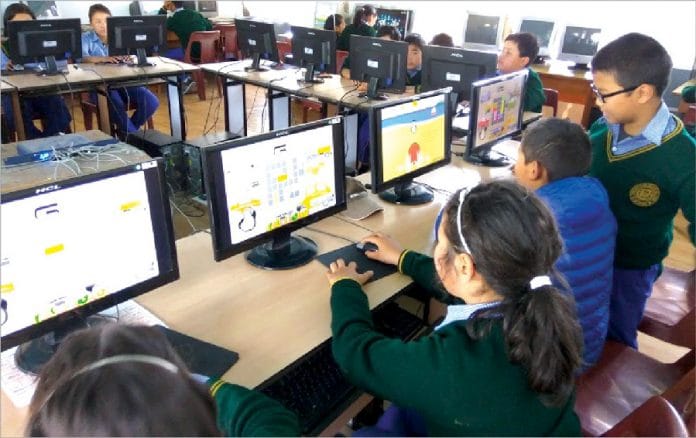Recherche Tech LLP, a three-year-old software company based in Ahmedabad, Gujarat, is striving to take the lead in applying innovative, affordable and inclusive open source solutions in the educational segment. Its first commercial product is ‘My sCool Server’, a unique all-in-one education technology solution built using open source technologies. Ideal for schools, colleges and trainers, My sCool Server is a feature-packed device for powering computer labs, smart classrooms and offline content e-libraries.
It is packaged with some of the best free educational tools available such as Sugar, GCompris, the early math content of Khan Academy, as well as several engaging open source games and colourful storybooks from Pratham.
In an exclusive interview with the OSFY Bureau, Jigish Gohil, co-founder and chief product architect, Recherche Tech LLP, talks about the product, the company’s sales strategy, the open source ecosystem, and how the firm built a business around it.

Q. Tell us more about your company. When and how did the My sCool Server journey begin?
A. Founded in 2016, Recherche Tech is recognised as a startup by the Department of Industrial Promotion and Policy, Ministry of Commerce & Industry, government of India under the Startup India initiative. Soon after the company was founded, My sCool Server was validated as an innovative product by the incubation centre at the National Institute of Design (NID), Ahmedabad.
The company’s name is derived from the French word Recherché. It is an adjective, the literal meaning for which is ‘rare, exotic or obscure’.
True to its name, Recherche Tech LLP was set up with the sole purpose of unearthing exotic and obscure technologies with the help of deep research. We innovate with these technologies, to create products and solutions for ICT in education, which will benefit the masses.
Social impact is one of our core concerns. We aim to bring the benefits of technology in education to the maximum number of schools possible, in a most cost-effective manner. We help schools leverage technology that allows them to continue using hardware they have already invested in, reduce their carbon footprint, and save on Internet bandwidth by providing rich content for students, even without going online.
My sCool Server is a result of over a decade’s experience in building education focused GNU/Linux distributions, and working closely with teachers and students to do so.
Earlier, I had created a solution called ‘Li-f-e: Linux for Education’, which was built on openSUSE and was being used by the Indonesian government school system nationwide. This was backed by my expertise in Linux Terminal Server Project (LTSP), and even received the FOSS India Award from Open Source For You magazine. We saw that there was a need for something that was easy to deploy, irrespective of the school’s computer lab set-up, but the solution also needed to provide quality offline content and measurable metrics. My sCool Server was conceptualised and created to address this need. The interactive whiteboard is the latest improvement added to it, based on our ongoing assessments of user requirements.
Q. Is My sCool Server the company’s first product or are there any other products as well?
A. My sCool Server is the first and only commercial product from the company. Though it was initially conceived to cater to the computer lab needs of the Gujarat State Board schools, today it has come a long way.
The Li-f-e: Linux for Education distribution on which the My sCool Server is built has been available as a free download since over a decade.
Q. Can you tell us more about the open source technologies you have used in building My sCool Server?
A. My sCool Server is built on off-the-shelf hardware – Intel NUC and open source technologies. Apart from the Li-f-e OS that is based on Ubuntu LTS, the Linux Terminal Server Project (LTSP) is integrated to serve ‘fat clients’ in lab computers. Also, the Epoptes teaching assistant is integrated so that teachers can screen broadcasts, as well as monitor and control each PC in the network. The Moodle LMS (learning management system), Kolibri to provide content from the Khan Academy, PHET, the CSpathshala curriculum, etc, and Sugarizer are integrated in the device. Spoken tutorial (spoken-tutorial.org) by IIT Mumbai, the National Repository of Open Educational Resources (NROER) initiative by the Central Institute of Educational Technology (CIET), and the NCERT are also made available offline for Indian schools.

Q. What were the biggest challenges that emerged initially while designing My sCool Server, and how did your team overcome them?
A. Our aim was clear about, “keeping things so simple that teachers and students are able to start using the system as soon as it is powered up, without having to go through manuals.” With My sCool Server, the basic operations are intuitive and advanced operations can be learnt without requiring extraordinary Linux systems administration know-how. We have designed a setup that configures all services automatically depending on the environment the device is plugged into. Creating a plug-and-play device that incorporates so many varied technologies on a Linux platform has been the biggest challenge, and overcoming this has been our greatest achievement. We have also put together excellent and relevant tutorials and manuals to enable smooth operations for everyday use.
Li-f-e began as an openSUSE based distribution. After openSUSE discontinued the release of live media, we had to look for an alternative base. Ubuntu was an obvious choice, as most Indian state computer education curricula are designed for it. The shift from openSUSE to an Ubuntu base without compromising on the user experience was one of the big challenges.
We have also designed a snapshot backup system that can create snapshots on the device or create bootable USBs with all customisations at any point.
Making modules of offline content platforms was another challenge, since each content provider uses different technologies. Moodle, for example, uses the full LAMP stack. We created a self-contained Bitnami bundle to provide everything it needed so that any breakage due to system updates does not affect its services.
Getting our product to the market is another big challenge — we are working very hard at it.
Q. Does your company also provide maintenance services post installation?
A. Yes, My sCool Server comes with a one-year limited warranty and a three-year hardware warranty, which is provided by the hardware vendor. Extending the warranty period is also possible. Our engineers can remotely fix any issues when a connection is initiated from the device. Telephonic support is also provided when no Internet is available. We, of course, provide training to teachers who will be operating the device and also offer an excellent user manual, which includes a troubleshooting guide for any problems that may arise.
Apart from this, we understand that accidents happen and that everyone deserves a second chance. Being open source, one may be tempted to play around with the server but we do not penalise users for doing so. The My sCool Server provides factory restore options via the server boot menu or with a USB created with the recovery.sh tool.
The factory restore option restores the system to the state the server was in when it left Recherche Tech’s premises, which may include customisation such as user accounts, etc, if that data had been given at the time of order placement.
Schools can easily create as many custom snapshots as they want even after customisation to the system, which can be restored at any point. This frees them from depending on us.
Q. What is your sales strategy? Which is your preferred choice – the online or offline channel?
A. We are setting up offline channel partners and working with many corporates on their CSR projects. We are also trying to make inroads with different governments (for example, the Bhutan government) to roll out My sCool Server on a large scale.
The nature of our business is more suited to the offline sales model, which is our preferred choice, because schools usually prefer someone to come to their premises to demonstrate, deploy and provide training to teachers. However, being a plug-and-play device that is intuitive to use, the online sales model could work as well.
Q. What challenges or uncertainties do you expect to face in the future?
A. Even though we have addressed the challenges of bringing together multiple complex technologies which are necessary in 21st century classrooms, conveying the real value of the developed product to the end users and getting every school to adopt it even in a small region is a massive challenge. My dream is to deliver the benefits of open source technologies and educational resources to every school possible.
Mass producing the device, distribution and customer support will be the other big challenges, once our user base crosses a critical mass.
Technology is ever evolving at a very fast pace, so keeping the device relevant with new developments as well as flexible in terms of providing new and user requested features quickly is another area to consider.
 Q. You have built your business around open source. What would you suggest to other entrepreneurs who are doing the same, or those who would want to do so?
Q. You have built your business around open source. What would you suggest to other entrepreneurs who are doing the same, or those who would want to do so?
A. The open source ecosystem is immense, with a huge potential to innovate by building on the already available amazing technologies. Entrepreneurs must find their niche and build something that solves real problems. Also, the focus should not be to just make life easier for those using their product, but to also make it an enriching experience. It is very hard work, but if they make a positive impact, then it is all worth it.
To know more about My sCool Server, refer to: https://www.myscoolserver.com/












































































